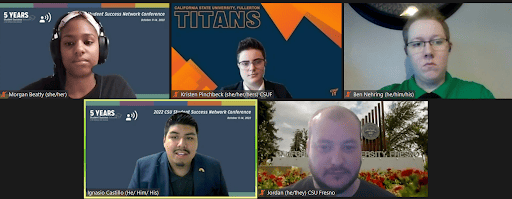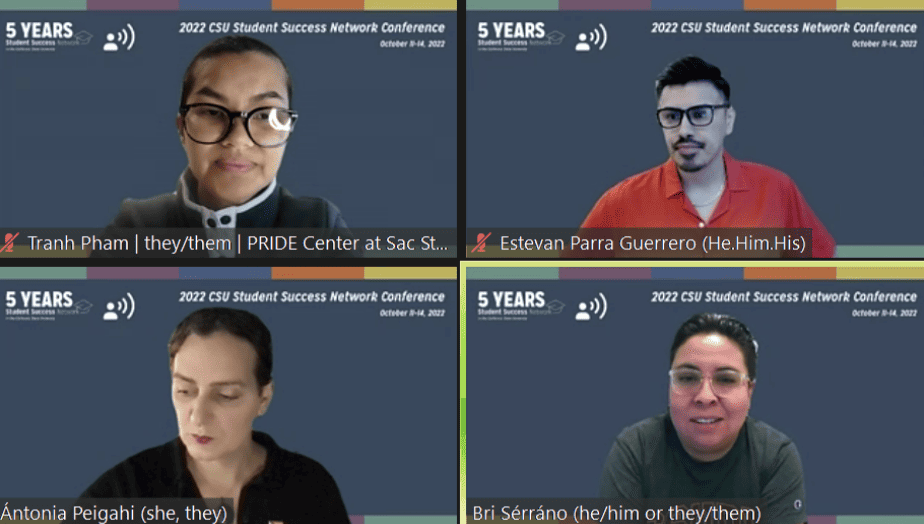By Thad Nodine
January 2023
This is the second of two blogs reporting on takeaways from the plenary sessions of the third annual CSU Student Success Conference, which was held virtually October 12 to 14, 2022. The first blog focused on efforts by CSU Dominguez Hills to re-enroll and re-engage students who had attended the university but did not receive a degree.
The 2022 CSU Student Success Conference featured two plenary sessions on equity and support for LGBTQIA2S+ students, staff, faculty, and administrators on CSU campuses. In the first of these sessions, CSU staff discussed how to create a safe, welcoming campus for students, staff, faculty, and administrators who identify as LGBTQIA2S+. The session also addressed equity challenges related to labor and resources for gender centers. The second plenary featured a panel of LGBTQIA2S+ students sharing their experiences and ideas regarding advocacy and equity. Both panels included representatives from several CSU campuses.
The Student Plenary

The student panelists began by describing the struggles they experience daily due to systemic and brazen acts of homophobia and transphobia that continue to occur in the United States, including direct violence, cyber bullying, harassment, and new governmental policies in many states that marginalize, demean, and threaten LGBTQIA2S+ communities. Given this disturbing national context, the students said that it is particularly important for CSU campuses to create welcoming and safe campuses for LGBTQIA2S+ students, and to also include explicit policies and resources available that support and provide gender affirming care.
On one hand, students said that their CSU campuses had taken some steps to support LGBTQIA2S+ students, through policies and programming. They also said, however, that more could be done to provide better outreach to students regarding these supports and to expand and increase funding for these kinds of programs.
Kristen Pinchbeck, a graduate student at CSU Fullerton, said, “A big assumption is that we’re all part of the CSU, we’re in California, so people think there are no problems here for LGBTQIA2S+ students …, as if there’s no homophobia or transphobia here. We know that’s not true. I’ve seen some of my professors get frustrated about a discussion about pronouns, but it’s affirming for many students … ]. How can we better support students’ holistic experience so that students aren’t carrying all these burdens on their own?”
“Stating pronouns is important,” said Ignasio Castillo, a student at CSU Bakersfield and vice president of legislative affairs for Associated Students, Incorporated (ASI), the campus’ student leadership organization. “Providing resources is also important, along with outreach so that people know about the resources.”
In terms of policies that can make a difference, Ben Nehring, a graduate student at Fresno State, pointed to a change that the CSU made that enabled students to change their official pronouns on their portals. “This one really impacted me personally,” Nehring said. He explained that before the change, he used to email every professor at the start of every new class. “It was like I had to come out over and over again to let them know my pronoun and my story and tell them not to bring this up in class. I dreaded the start of every semester.” He called the change “revolutionary” for him, because the campus was acknowledging his own agency and power in choosing his identity and making him feel recognized and validated.
Jordan Fitzpatrick, a graduate student at Fresno State and a social work intern at the campus counseling center, identified another policy issue that resonated with the other panelists. He recommended that every CSU campus needs to develop an “intersectional strategy” that acknowledges and builds on the diversity that each person represents. “People are more than one identity,” he said, “and it’s important to understand that.”
Morgan Monae Beatty, a graduate student at Sacramento State, agreed, saying that issues of race, sexuality, and gender are not separate and that advocacy and decision-making need to be inclusive. “Everyone deserves a seat at the table,” she said. “Campuses coming together to talk about how they acknowledge and address these issues can be very helpful in creating a healthy campus climate for all students.”
Nehring suggested that developing intersectional strategies could help campuses improve outreach to students across groups and programs. “We are very siloed within higher education,” he said. “We have a queer event going on, so they reach out to queer groups on campus…. But you should also be reaching out to the African American groups on campus, the Latinx groups, the ability groups…. We [in higher education] are siloed, but people themselves are not siloed.”
“Any kind of activism has to be activism for everybody,” explained Kristen Pinchbeck. “When we’re doing our LGBTQ work, it has to be anti-racist. It has to be disability friendly. It has to be all these things because that’s how we’re going to show people that all of these identities do come together, and they all matter.”
Watch the student plenary from the 2022 conference here.
The Staff Plenary

As with the students, the staff plenary explored a range of issues associated with the importance of creating safe spaces and welcoming campuses for students in the CSU. This included the need for the CSU system and each campus to invest in resources to provide and sustain supportive programming and services. As panel moderator Ántonia Peigahi said, “At Sacramento State, President Nelson has described budgets as moral documents, and I think it’s a really important point to think about the morality behind the services that we provide, and how we’re funding those sets of services.” Peigahi is director of policy and records management at Sacramento State.
The other three panelists and colleagues, each of whom coordinates or manages PRIDE, gender, or cultural centers on CSU campuses, discussed the resource limitations associated with this work. Based on their discussion, programs that serve LGBTQIA2S+ students vary by campus, with some campuses having dedicated space for these services and others sharing spaces with other departments. Some described multiple staff positions—for example, for LGBTQIA2S+ services, for gender programming, and for services for Black men. Others described a single position coordinating all these services.
According to Tranh Pham, who was program coordinator of the PRIDE Center at Sacramento State at the time of the conference, “We do the best we can in the center, but sometimes I feel like I’m drowning with the different types of needs students have. We’re not just talking about basic needs, but trauma sets that students are carrying with them … we are a small center. At the end of each day, it feels exhausting.”
“We could start by hiring more professional staff and give us additional space,” said Estevan Parra Guerrero, Jr., who was coordinator of the Cross-Cultural and Gender Center at Fresno State at the time of the conference. “We’ve outgrown our space. Our space was originally started to serve students only, … but we also serve staff, alumni, faculty, and community members. This year we are providing gender affirming care, too. We have come a long way, but there’s still so much work that we—not just Estevan—need to do.”
Bri Sérráno, program director of the Queer Culture and Resource Center at CSU Dominguez Hills, spoke about progress made and the need for further work in gathering and understanding student data—including transparent communications about definitions on CSU’s application form. Sérráno also emphasized the importance of the LGBTQIA2S+ community being part of system-wide efforts to ensure that this work is sustainable. “I think there needs to be long-term strategic planning from the Chancellor’s Office … with all of us at the table.”
Watch the staff plenary from the 2022 conference here.
Over 290 CSU middle leaders and students participated in the Student Success Conference, which focused on “Sustaining Momentum for Equity and Change in the CSU.” The CSU Student Success Conference is the only conference for the CSU that brings together practitioners, faculty, administrators, and students across roles and campuses to share evidence, practices, and actionable research in support of equitable student success.
